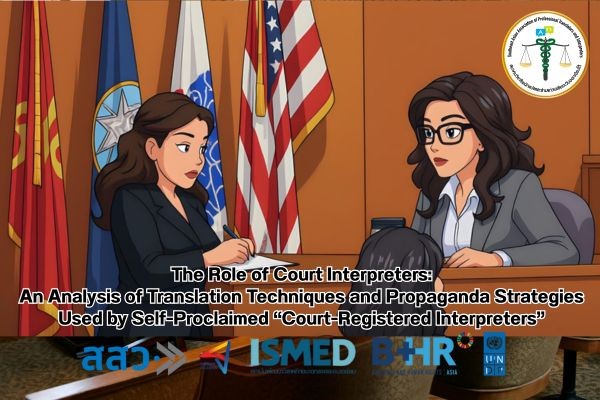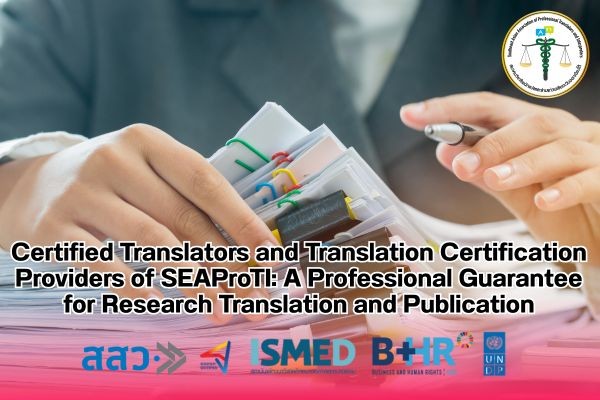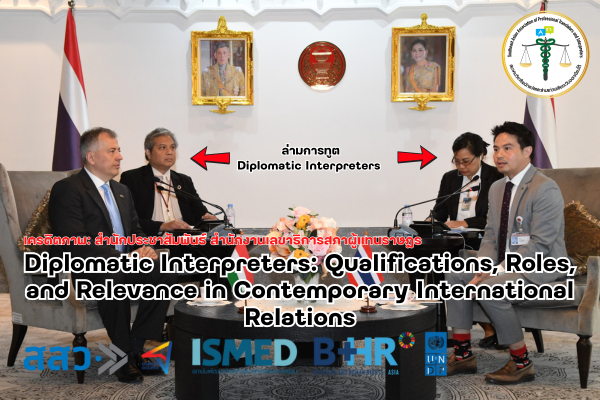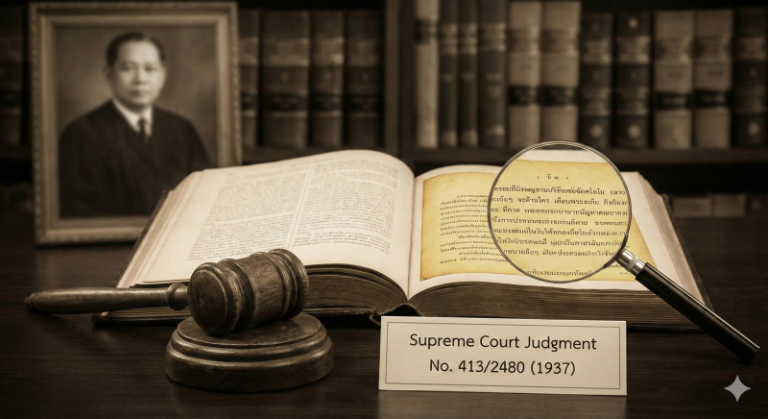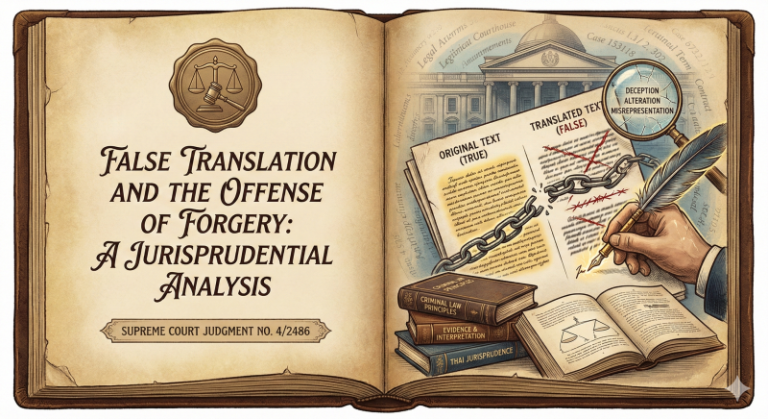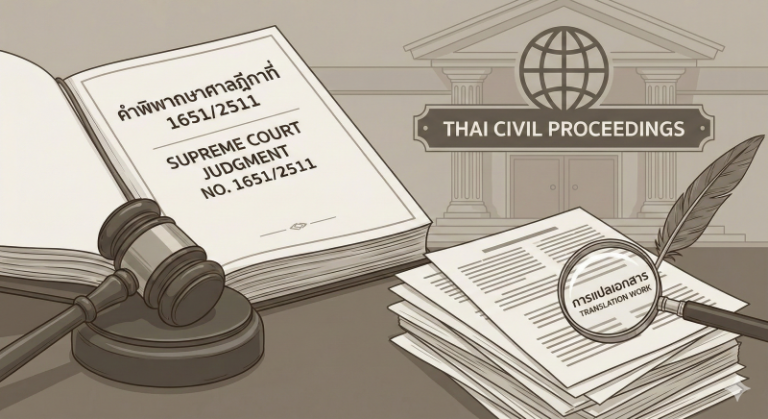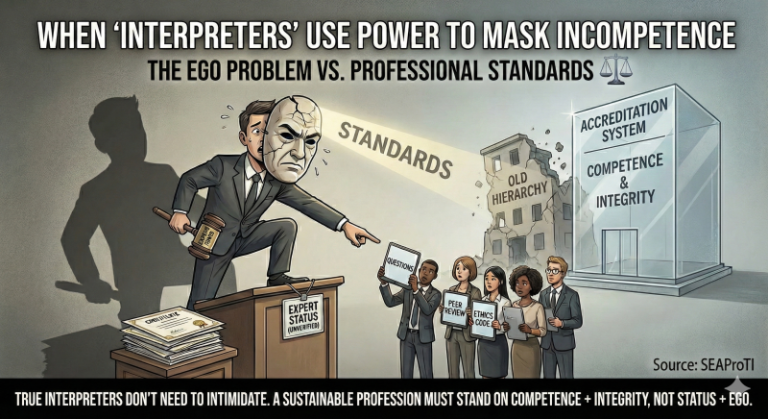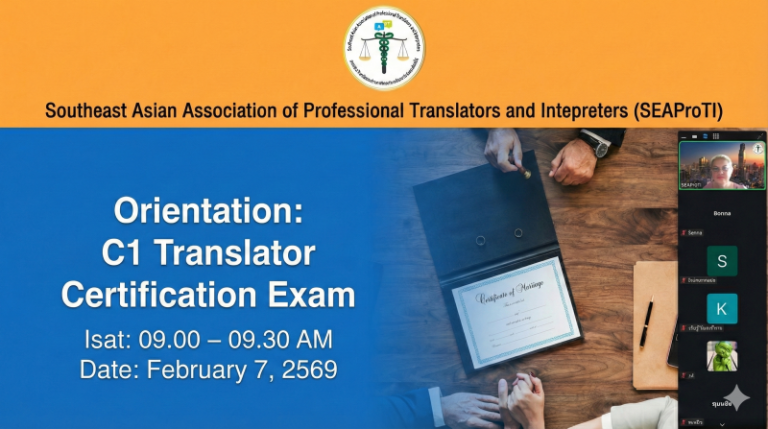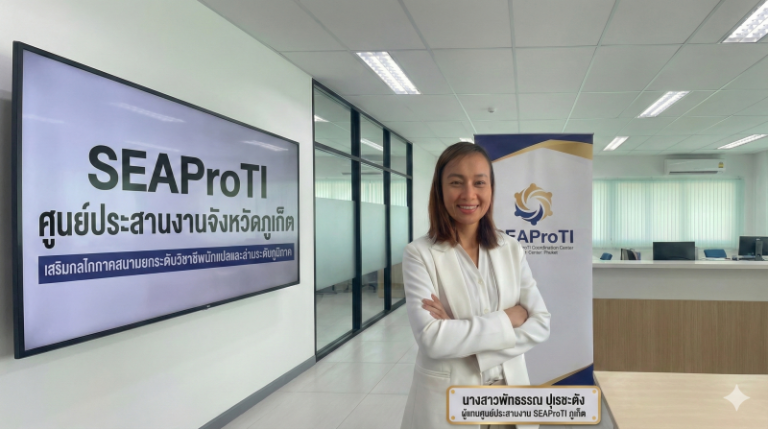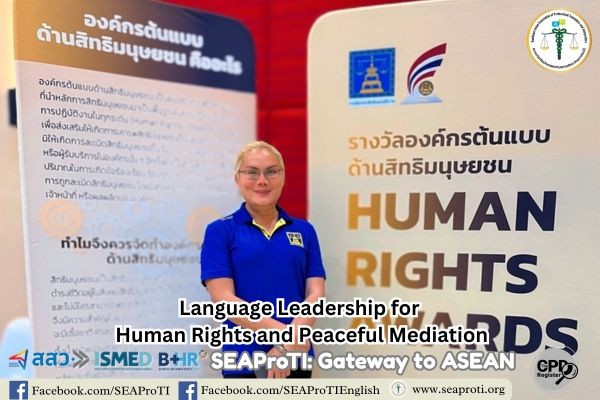The Role of Court Interpreters:
An Analysis of Translation Techniques and Propaganda Strategies Used by Self-Proclaimed “Court-Registered Interpreters”
30 June 2025, Bangkok – This article critically examines the strategies employed by interpreters who claim to be “court-registered” without verifiable evidence of registration or certification by legally authorized bodies. Findings reveal that such interpreters often engage in ethically questionable translation practices—such as omission, addition, and mistranslation—that distort the intended meaning of testimony. These behaviors may be interpreted as forms of propaganda techniques, which subtly influence judicial perceptions even in situations where interpreters have sworn an oath. The article proposes corrective measures, including the use of certified interpreters and the integration of interpreter-monitoring mechanisms into court procedures, in order to protect litigants’ rights and uphold the principles of a fair trial.
Introduction
In the context of Thai judicial proceedings, the presence of interpreters in cases involving non-Thai-speaking individuals is fundamental to the right to a fair hearing, as protected under international human rights law (UN General Assembly, 1966, Article 14). This is especially relevant in criminal cases, where Thailand is obligated to ensure compliance as a state party. However, a recurring issue in Thai labor and civil courts is the presence of interpreters who claim to be “court-registered” without official documentation or certification from recognized regulatory authorities. These individuals often lack formal training in legal interpretation, despite the fact that procedural guidelines for civil cases explicitly state that parties are responsible for securing and compensating their own interpreters. Courts may arrange interpreters only upon request, and the requesting party must bear the cost according to judicial regulations.
Although such interpreters are required to swear an oath of honesty before performing their duties, this ritualistic safeguard often fails to deter unethical conduct. This article analyzes the translation techniques used by unverified interpreters through the lens of propaganda strategies—a linguistic framework that highlights how language can be manipulated to construct influence and perception within the courtroom.
Translation Techniques That Distort Legal Testimony
Omission
Some interpreters selectively omit critical components of witness testimony, such as contextual explanations or behavior before and after the alleged incident. This technique can disadvantage one party while favoring the other. It aligns with the Card Stacking method of propaganda, wherein information is selectively presented to support a particular position (Jowett & O’Donnell, 2019). Additionally, interpreters may invoke their alleged “court registration” to associate themselves with judicial authority—a form of the Transfer technique, which borrows credibility from established institutions (Pratkanis & Aronson, 2001).
Addition
In other cases, interpreters insert extraneous content—emotive language, interpretive elaborations, or inflated phrasing—thus deviating from the source material’s intent. These instances constitute Glittering Generalities or Bandwagon tactics, which aim to invoke positive emotions or imply broad consensus to sway judicial perception (Jowett & O’Donnell, 2019).
Mistranslation
Mistranslations often stem from inadequate proficiency in the source or target language, particularly regarding legal terminology. Misinterpretations such as translating “alleged” as “admitted wrongdoing” or “plea bargain” as “negotiation of innocence” fundamentally alter the legal meaning and context. These practices reflect Appeal to Authority—relying on a false sense of legitimacy—and Plain Folks—portraying oneself as a relatable, trustworthy figure who understands the legal system (Pratkanis & Aronson, 2001).
The Limitations of Oath-Taking
While interpreters are required to swear an oath of fidelity and neutrality (as per Section 118 of the Thai Civil Procedure Code), such formalities are insufficient to prevent unethical behavior without robust verification mechanisms. The absence of a centralized certification database enables unqualified interpreters to manipulate the legal process with impunity.
Recommendations: Certified Interpreters and Oversight Mechanisms
To minimize risks of distortion and misrepresentation, the following measures are proposed:
- Use of Certified Interpreters
- Only interpreters certified by professional organizations such as the Southeast Asian Association of Professional Translators and Interpreters (SEAProTI) should be permitted to serve in court. These interpreters should be listed in a publicly accessible national database to facilitate transparency and accountability (SEAProTI, 2025).
- Implementation of Oversight Mechanisms
- Parties should be allowed to bring their own certified interpreters as Check Interpreters to monitor courtroom translation or serve as Co-Interpreters in high-stakes cases (e.g., labor disputes, criminal trials, human rights litigation). This dual-layered approach would provide real-time quality assurance and reduce interpretive misconduct.
Conclusion
The role of interpreters in the Thai judiciary requires not only language proficiency but also a firm grounding in legal knowledge and professional ethics. Individuals who falsely claim to be “court-registered interpreters” without proper accreditation may employ manipulative translation strategies that compromise the integrity of judicial proceedings. This article calls for systemic reform: certification of legal interpreters, public disclosure of accredited professionals, and the institutionalization of interpreter oversight in courtrooms. Such reforms are essential for ensuring linguistic fairness and safeguarding the right to a fair trial in multilingual judicial contexts.
References
- Jowett, G. S., & O’Donnell, V. (2019). Propaganda & Persuasion (7th ed.). SAGE Publications.
- Pratkanis, A., & Aronson, E. (2001). Age of Propaganda: The Everyday Use and Abuse of Persuasion. W. H. Freeman.
- SEAProTI. (2025). Standards for Certified Legal Interpreters in Southeast Asia. Southeast Asian Association of Professional Translators and Interpreters.
- UN General Assembly. (1966). International Covenant on Civil and Political Rights. Treaty Series, 999(14668), Article 14.
SEAProTI’s certified translators, translation certification providers, and certified interpreters:
The Southeast Asian Association of Professional Translators and Interpreters (SEAProTI) has officially announced the criteria and qualifications for individuals to register as “Certified Translators,” “Translation Certification Providers,” and “Certified Interpreters” under the association’s regulations. These guidelines are detailed in Sections 9 and 10 of the Royal Thai Government Gazette, issued by the Secretariat of the Cabinet under the Office of the Prime Minister of the Kingdom of Thailand, dated July 25, 2024, Volume 141, Part 66 Ng, Page 100.
To read the full publication, visit: the Royal Thai Government Gazette
บทบาทของล่ามในศาล: การวิเคราะห์เทคนิคการแปลและกลวิธีโฆษณาชวนเชื่อของล่ามที่อ้างว่า ‘ขึ้นทะเบียนกับศาล’
30 มิถุนายน 2568, กรุงเทพมหานคร – บทความนี้วิเคราะห์กลวิธีในการแปลคำเบิกความในศาลของ “ล่ามที่อ้างว่าเป็นล่ามขึ้นทะเบียนกับศาล” แม้ไม่ได้มีการพิสูจน์ทราบว่าล่ามคนดังกล่าวผ่านการขึ้นทะเบียนหรือรับรองโดยหน่วยงานที่มีอำนาจตามกฎหมาย การศึกษาพบว่า ล่ามกลุ่มนี้ใช้กลวิธีที่เข้าข่ายการบิดเบือนเนื้อหาและเจตนาของคู่ความผ่านเทคนิคการแปลที่ผิดจรรยาบรรณ เช่น การแปลตัด แปลเกิน และแปลผิด ซึ่งสามารถจัดเข้าเป็นเทคนิค “โฆษณาชวนเชื่อ” (propaganda techniques) ที่มีผลต่อการโน้มน้าวศาลอย่างแยบยล แม้มีการสาบานตนแล้วก็ตาม บทความเสนอแนวทางแก้ไขโดยการใช้ล่ามรับรองจากองค์กรวิชาชีพและการนำกลไกตรวจสอบล่ามเข้าสู่กระบวนการพิจารณาคดี เพื่อคุ้มครองสิทธิของคู่ความตามหลักการพิจารณาคดีอย่างเป็นธรรม และผู้ที่อยู่ในกระบวนการยุติธรรมจะต้องเท่าทัน
บทนำ
ในกระบวนการพิจารณาคดีของศาลไทย การมีล่ามในคดีที่เกี่ยวข้องกับบุคคลที่ไม่เข้าใจภาษาไทยถือเป็นองค์ประกอบสำคัญของสิทธิในการรับฟังอย่างเป็นธรรม (fair hearing) ตามหลักสิทธิมนุษยชนสากล (UN General Assembly, 1966, Article 14) โดยเฉพาะคดีอาญา ที่ไทยเป็นภาคีและต้องปฏิบัติตามหลักดังกล่าว อย่างไรก็ตาม ปัญหาที่ปรากฏอย่างเป็นรูปธรรมในศาลแรงงานและศาลแพ่งในปัจจุบันคือ มีการอ้างตนเป็น “ล่ามขึ้นทะเบียนกับศาล” โดยไม่มีหลักฐานหรือใบอนุญาตที่ตรวจสอบได้จากหน่วยงานรับรอง หรือไม่ผ่านการอบรมตามมาตรฐานสากลในการแปลในกระบวนการยุติธรรม และในคดีแพ่ง คู่มือข้าราชการตุลาการระบุชัดเจนว่า ในทางปฏิบัตินั้น ให้คู่ความนำล่ามมาเอง และตกลงเรื่องค่าใช้จ่ายกันเอง แต่หากหาล่ามไม่ได้ ก็สามารถขอให้ศาลจัดหาล่ามให้ และผู้ที่ขอล่ามจะต้องจ่ายค่าล่ามตามระเบียบที่ศาลกำหนด
ล่ามกลุ่มนี้แม้จะสาบานตนก่อนปฏิบัติหน้าที่ตามระเบียบศาล ก็ยังสามารถใช้อิทธิพลผ่านเทคนิคการแปลเพื่อโน้มน้าวศาลโดยไม่ซื่อสัตย์ต่อบทบาทของตนได้ บทความนี้เสนอการวิเคราะห์เชิงวิพากษ์ต่อเทคนิคการแปลของล่ามประเภทดังกล่าว และชี้ให้เห็นว่า กลวิธีที่ใช้ในการโน้มน้าวศาลสามารถอธิบายได้ผ่านกรอบแนวคิดของ “เทคนิคโฆษณาชวนเชื่อ” (propaganda) ซึ่งเป็นเครื่องมือทางภาษาศาสตร์ที่ใช้สร้างภาพลักษณ์และอิทธิพลต่อผู้รับสาร
เทคนิคการแปลของล่ามที่บิดเบือนข้อเท็จจริง
- การแปลตัดหรือละเว้น (Omission)
- ล่ามบางรายเลือกที่จะแปลเพียงบางส่วนของคำเบิกความ และละเว้นเนื้อหาสำคัญ เช่น คำอธิบายบริบท พฤติกรรมก่อนหรือหลังเหตุการณ์ หรือละเลยการแปลถ้อยคำที่เป็นประโยชน์แก่ฝ่ายตรงข้าม กลวิธีนี้สามารถเทียบได้กับเทคนิค Card Stacking ของโฆษณาชวนเชื่อ ซึ่งเป็นการเลือกเสนอเฉพาะข้อมูลที่สนับสนุนฝ่ายตน (Jowett & O’Donnell, 2019)
- นอกจากนี้ ล่ามยังอาจอ้างตำแหน่งว่าเป็น “ล่ามขึ้นทะเบียนกับศาล” เพื่อโยงความน่าเชื่อถือของศาลมาสู่ตนเอง โดยใช้เทคนิค Transfer ซึ่งเป็นการโอนอำนาจของสถาบันที่มีความน่าเชื่อถือมาใช้ประกอบความน่าเชื่อถือของตน (Pratkanis & Aronson, 2001)
- การแปลเกินหรือแปลเพิ่ม (Addition)
- ในบางกรณี ล่ามแปลเพิ่มเติมจากต้นฉบับ เช่น การเสริมถ้อยคำเชิงอารมณ์ การอธิบายเกินความจำเป็น หรือใช้คำฟุ่มเฟือยที่บิดเบือนเจตนาเดิม เทคนิคนี้เข้าข่าย Glittering Generalities หรือ Bandwagon ซึ่งเป็นการเสริมภาพลักษณ์ทางอารมณ์หรือชวนให้ศาลคล้อยตามทัศนะของพยานโดยไม่รู้ตัว (Jowett & O’Donnell, 2019)
- การแปลผิดความหมาย (Mistranslation)
- เกิดจากการที่ล่ามขาดความเข้าใจเชิงลึกในภาษาต้นทางหรือภาษาปลายทาง โดยเฉพาะศัพท์ทางกฎหมายหรือบริบทเฉพาะ ล่ามอาจแปลคำว่า “alleged” ว่า “ยอมรับว่าได้กระทำผิด” หรือแปลคำว่า “plea bargain” ว่า “ต่อรองเพื่อความบริสุทธิ์” ซึ่งผิดทั้งในทางความหมายและนิติศาสตร์ เทคนิคที่พบคือ Appeal to Authority และ Plain Folks คือการแสดงความน่าเชื่อถือปลอม ๆ ด้วยการอ้างตำแหน่งหรือแสดงตัวเป็นคนธรรมดาที่เข้าใจระบบศาล (Pratkanis & Aronson, 2001)
ข้อจำกัดของการสาบานตน
แม้ศาลจะมีขั้นตอนให้ล่ามสาบานตนว่าจะทำหน้าที่อย่างสุจริต (ตาม ป.วิ.พ. มาตรา 118) แต่การสาบานตนในเชิงพิธีกรรมไม่สามารถป้องกันพฤติกรรมละเมิดจรรยาบรรณได้ หากไม่มีระบบตรวจสอบที่เข้มแข็ง การอ้างตนเป็น “ล่ามขึ้นทะเบียนกับศาล” โดยไม่มีใบรับรองหรือไม่มีระบบฐานข้อมูลกลางเพื่อตรวจสอบ ก็เปิดช่องให้เกิดการบิดเบือนความหมายได้อย่างไร้การรับผิดชอบ
แนวทางแก้ไข: การใช้ล่ามรับรองและกลไกตรวจสอบ
เพื่อลดความเสี่ยงในการแปลผิดพลาดและการบิดเบือนข้อมูล ควรดำเนินการดังนี้:
- ใช้ล่ามรับรองจากองค์กรวิชาชีพ (Certified Interpreters)
- ล่ามที่ผ่านการรับรองจากองค์กรวิชาชีพ เช่น สมาคมวิชาชีพนักแปลและล่ามแห่งเอเชียตะวันออกเฉียงใต้ (SEAProTI) ควรได้รับการยอมรับให้ทำหน้าที่ในศาล และควรมีการประกาศรายชื่อล่ามรับรองในระบบฐานข้อมูลกลางอย่างเปิดเผย (SEAProTI, 2025)
- ใช้กลไกตรวจสอบ (Check/Co-Interpreters)
- ให้คู่ความนำล่ามรับรองฝ่ายตนเข้าร่วมฟังการแปลในฐานะ Check Interpreters หรือใช้ล่ามร่วม (Co-Interpreters) เพื่อคอยตรวจสอบคำแปล โดยเฉพาะในคดีที่มีผลกระทบสูง เช่น คดีแรงงาน คดีอาญา หรือคดีสิทธิมนุษยชน
บทสรุป
บทบาทของล่ามในศาลไทยต้องอาศัยทั้งความสามารถทางภาษา ความเข้าใจในระบบกฎหมาย และจรรยาบรรณวิชาชีพอย่างเคร่งครัด ล่ามที่อ้างตนเป็น “ล่ามขึ้นทะเบียนกับศาล” โดยไม่มีการรับรอง อาจใช้เทคนิคการแปลที่บิดเบือนข้อเท็จจริงและสร้างผลกระทบต่อความยุติธรรมของคดีอย่างร้ายแรง บทความนี้เสนอให้มีระบบการรับรอง การประกาศรายชื่ออย่างเปิดเผย และการใช้กลไกตรวจสอบร่วม เพื่อรักษาความเป็นธรรมในกระบวนการพิจารณาคดี
อ้างอิง:
- Jowett, G. S., & O’Donnell, V. (2019). Propaganda & Persuasion (7th ed.). SAGE Publications.
- Pratkanis, A., & Aronson, E. (2001). Age of Propaganda: The Everyday Use and Abuse of Persuasion. W. H. Freeman.
- SEAProTI. (2025). Standards for Certified Legal Interpreters in Southeast Asia. สมาคมวิชาชีพนักแปลและล่ามแห่งเอเชียตะวันออกเฉียงใต้.
- UN General Assembly. (1966). International Covenant on Civil and Political Rights. Treaty Series, 999(14668), Article 14.
เกี่ยวกับนักแปลรับรอง ผู้รับรองการแปล และล่ามรับรองของสมาคมวิชาชีพนักแปลและล่ามแห่งเอเชียตะวันออกเฉียงใต้
สมาคมวิชาชีพนักแปลและล่ามแห่งเอเชียตะวันออกเฉียงใต้ (SEAProTI) ได้ประกาศหลักเกณฑ์และคุณสมบัติผู้ที่ขึ้นทะเบียนเป็น “นักแปลรับรอง (Certified Translators) และผู้รับรองการแปล (Translation Certification Providers) และล่ามรับรอง (Certified Interpreters)” ของสมาคม หมวดที่ 9 และหมวดที่ 10 ในราชกิจจานุเบกษา ของสำนักเลขาธิการคณะรัฐมนตรี ในสำนักนายกรัฐมนตรี แห่งราชอาณาจักรไทย ลงวันที่ 25 ก.ค. 2567 เล่มที่ 141 ตอนที่ 66 ง หน้า 100 อ่านฉบับเต็มได้ที่: นักแปลรับรอง ผู้รับรองการแปล และล่ามรับรอง


